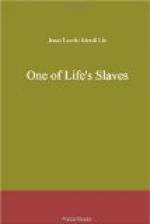And now the thing was to find an extra-healthy, thoroughly strong nurse for Consul-General Veyergang’s two delicate, newly-arrived, little ones.
Dr. Schneibel had very thoughtfully kept a nurse in reserve for Mrs. Veyergang—“a really remarkable specimen of the original healthiness in the common stock. One might say—h’m, h’m—that if Mrs. Veyergang could not get to the mountains, the mountains were so courteous as to come to her. The girl still had an odour of the cowshed about her perhaps; but when all’s said and done, that was only a stronger assurance of originality. And that is an important factor in our day, madam, when milk is adulterated even from the very cows themselves.—Quite young, scarcely twenty!”
Barbara Hoegden had not the faintest suspicion, as she carried water and wood, or stood at the edge of the ice beating linen, or did any drudgery she could find to do, in order to earn a little money to pay for herself and her baby at the tinsmith’s, that, from her deepest degradation, she had risen at one step to the rank of an exceptionally sought-after and esteemed person in the town.
For a nurse is an esteemed person. Indeed, she is on the expectancy list to become respected.
After having nursed her mistress’s child, and been a correspondingly unnatural mother to her own, she ends by sleeping on down, and being considered in every way, until a new nurse for a new heir deposes her from her dynasty.
Should she prefer to give her own little baby the only treasure she possesses, her healthy breast, should she really be so blind to her own interests, why then the case is different, and (to use Dr. Schneibel’s words) not altogether unmerited, only a result of the social economy to which she does not know how to be intelligently subordinate, and which will reduce her, with the inexorable logic of the laws of civilisation, to a useless superfluity, which Society’s organism rejects. Or, vulgarly speaking, she is left with shame, contempt and poverty resting upon both her and her illegitimate offspring. As a private individual, she is in a sense right; but socially, as a member of society——!
At first poor Barbara was quite blind on this point, utterly obstinate, rigid as a mountain pony that could not be got to stir.
Dr. Schneibel was standing for the third time at the tinsmith’s, with his stick under his nose, while his gig waited down in the road. Each time he had added to both wages and arguments, and had again and again pointed out how bad it would be both for her and her boy if she continued so obstinate. He appealed to her own good sense. How could she expect to bring him up in such poor, narrow circumstances, and with all this toiling and moiling? She would only need to give up a part of her large wages to the tinsmith, and they would look well after the boy. Besides she could often come out and see him, at least once a month!—he could promise her that on the Veyergangs’ behalf, and it was very kind of them now they lived such a long way out of town.




